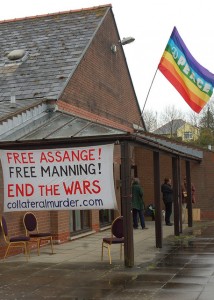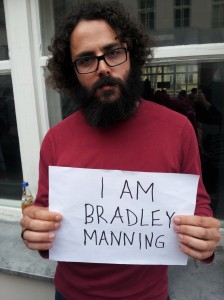Update 4/17/12: Obama and whistleblowers, former UK ambassador supports Bradley, and what Bradley revealed about international law

Wales demonstration for Bradley
Paul Harris highlights the Obama administration’s disturbing treatment of whistleblowers. Documenting the various accused whistleblowers charged under the Espionage Act, Harris brings attention to the Obama administration’s obsessive secrecy:
Defenders of Obama’s record on these whistleblowers point to a national security defence and say they actively encourage people to speak out about wrongdoing elsewhere. Whistleblowing may be one thing, they say, but intelligence leaking is another. Every government has a right to protect its secrets. But one can also point to other areas where the Obama administration has shown a love of secrecy that should shame the Democrats who slammed President George Bush for a similar attitude.
Harris reminds that these prosecutions come despite promises of an unprecedentedly transparent government. (Read more…)
Former UK ambassador to Uzbekistan supports Bradley Manning. Craig Murray speaks for Bradley in a lecture entitled “Why do we need whistleblowers in a democracy?” A BBC interview with Murray explaining his position on whistleblowers and Bradley can be found here.
Chase Madar says Bradley Manning and WikiLeaks revealed the injustice of international law. Scores of documents WikiLeaks released exposed war crimes and other breaches of U.S. or international law. But many of the atrocities unveiled are actually legally allowed. Chase Madar argues that these laws are created by the powerful to abuse the powerless:
The real problem with the laws of war, however, is not what they fail to restrain but what they authorize. The primary function of International Humanitarian Law is to legalize remarkable levels of “good” military violence that regularly kill and injure non-combatants. IHL highlights a handful of key principles: the distinction between combatant and civilian, the obligation to use force only for military necessity and the duty to jeopardize civilians only in proportion to the military value of a target.
Madar uses the chatlogs released by WIRED to contend that Bradley understood this problem, and wanted to the American people to see what its government did in secret:
(02:27:47 PM) bradass87: i mean, we’re better in some respects…we’re much more subtle…use a lot more words and legal techniques to legitimize everything…
(02:28:19 PM) bradass87: but just because something is more subtle, doesn’t make it right
Also in these chatlogs, Bradley said he saw how the “first world exploits the third.” (Read more…)

"I am Slim Amamou, and Bradley Manning saved my life. With the leaks he provided, he participated in the Tunisian revolution. And if it were not for the Tunisian revolution I would probably be dead or in jail now. At that time, I was in jail and I was saved by the fact that Ben Ali, the president of the bad regime, fled the country."









